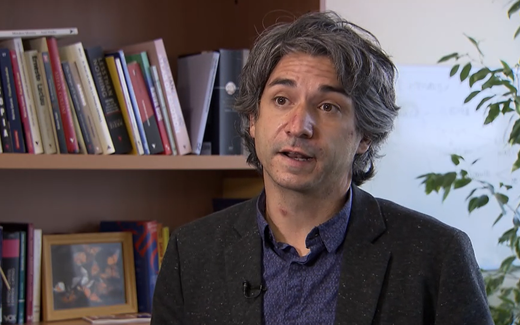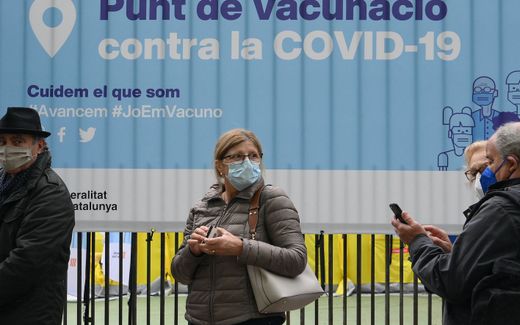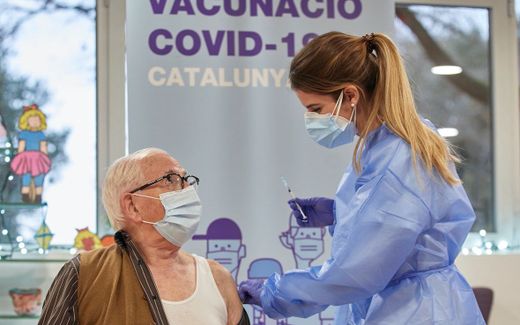Weekly column from Spain: Forging the new generation at school, then and now
29-04-2022
Christian Life
Jorge Ruiz, CNE.news
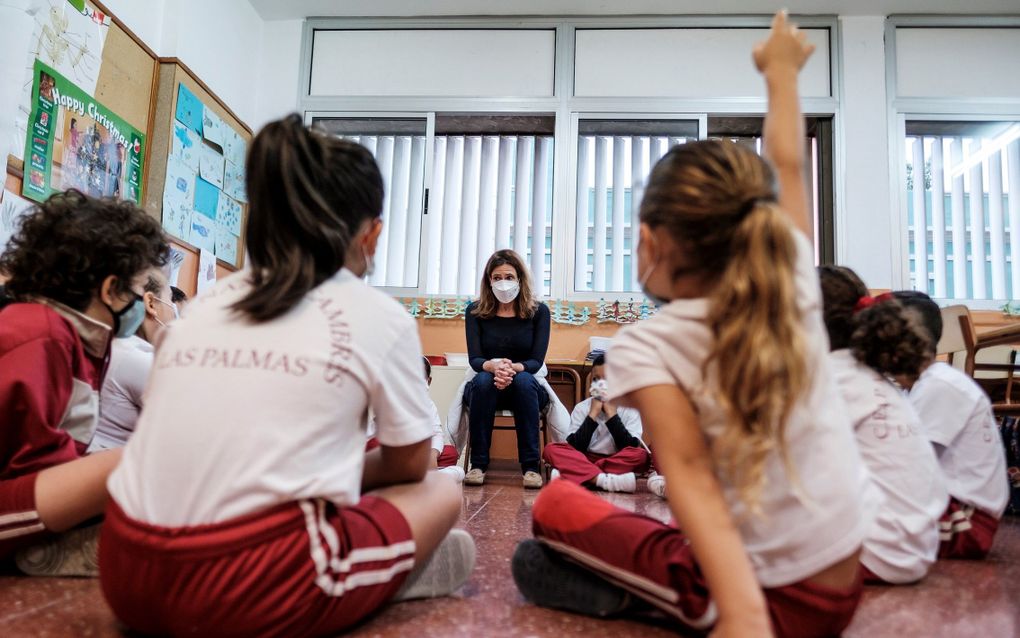
Spanish school class. Photo EPA, Angel Medina
Christian Life
On October 28, 1982, the Socialist Party won its first general elections by a devastating majority. They received 202 deputies, almost double the number of deputies of the second-largest party, Alianza Popular (now Partido Popular). Reason: the promise to end NATO membership.
The socialists had promised to hold a referendum about NATO. Spain had joined the alliance only five months earlier, under the previous centre-right government. The Socialist Party had opposed it with the slogan: "NATO, no entry". Another of the party's star promises in those elections was that they would create 800,000 jobs during their term in office.
Jorge Ruiz (1969) was born in Barcelona, Spain. At the age of 19, he was converted to the Christian faith.
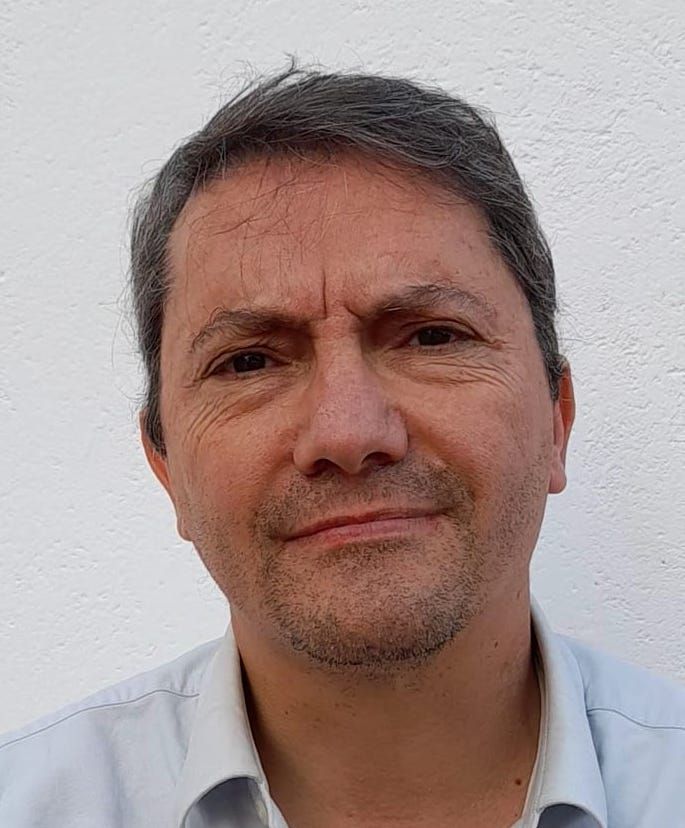
He graduated in Journalism at the University of Barcelona and received a PhD in Theology at the Faculté Libre de Théologie Réformée in Aix-en-Provence, France. He serves as a Protestant pastor in Spain. He is assessor for the Trinitarian Bible Society for the Spanish and French projects. He is married and father of four.
The overwhelming majority in Congress allowed the new Socialist government to undertake one of the most significant social and cultural changes in history in the shortest possible time. The future vice-president of the government already announced the change on the night of the 1982 election victory. Then he proclaimed the mythical phrase of unmistakable Hispanic flavour: Vamos a poner a España que no la va a reconocer ni la madre que la parió (meaning something like: We're going to transform Spain in such a way that not even her mother will recognise it).
In the latter, they did keep their word: indeed, in just four or five years, the Socialist government absolutely transformed the country, especially morally and spiritually. But in everything else, the fulfilment of electoral promises turned out to be less than satisfactory. By 1986, instead of creating 800,000 jobs, the number of unemployed in Spain had reached three million people.
Receiving diploma by attending workshops
Moreover, the government did indeed hold the promised referendum on NATO. However, it turned out that it was the only political force that advocated Spain's continued membership of the military organisation! The Spanish genius reflected this contrast between the promise and reality of the Socialist government of the time with jokes that still exist: "We were going to create 800 or 1,000 jobs"; "NATO, no entry... no exit either".
When the socialist party won the elections in 1982, I was in the last year of primary school at a public school in Tarrasa (Barcelona). At that time, the primary school leaving certificate (called Graduado Escolar) was a demanding qualification which allowed you to go on to the Baccalaureate. Those who did not obtain it could continue studying polytechnic studies or start working – the legal age to start working was then 14 years old.
At the beginning of our last year of primary school, there were fifteen of us left in the class – the others had probably gone to work. So, at the beginning of that year, at the end of September, more or less coinciding with the imminent Socialist victory, the teachers came to us, students, with a surprising proposal: all the students were going to receive the School Leaving Certificate, regardless of the marks we were going to get in June. But every afternoon, instead of courses, we would have to have attend workshops on subjects such as evolution, historical materialism, sex education, the expression of feelings or incipient feminism. Issues that were truly revolutionary in the Spain of the time, which was still Catholic for almost 99 per cent of its population.
From believer to atheist to believer
In barely ten months, those workshops had a genuinely astonishing ideological effect. For example, during the course, the class wrote a letter to the new Socialist government, hailing it as the government of the working class (sic!), and urging it to undertake things such as legalising abortion which it did in 1985.
When the course ended, I (who a year earlier still believed in God, in the Catholicism of my childhood) declared myself an atheist, a communist, a supporter of homosexuals and many other things. I got to the Baccalaureate, but I spent it without studying at all, so I went from having excellent results in primary school before its last year to having mediocre marks afterwards.
My four years of secondary education were rebellion and darkness in that foreseen unknown Spain. To sum up the story of my youth a little, I was converted to God at the age of 19, when I was in the first year of university, which I entered without shame or glory.
New law feels familiar
By now, you may be wondering why I am telling you all these things. Well, this is what the following news has evoked in me: in March's last Council of Ministers of the Social-communist government in Spain, a reform of the last years of primary school (or the secondary studies before the Baccalaureate, ESO, as it is officially called) was approved. According to this reform, pupils will be able to graduate and go on to the Baccalaureate with no limit on the number of failed exams.
In addition, it renounces a chronological study of history, in which the main historical events (the Discovery of America or the French Revolution, for example) are reduced in favour of a study by thematic blocks, such as "the social inequality and the power struggle", "the marginalisation, segregation, control and submission in the history of mankind", "the family, lineage and caste" or "the role of religion in a social organisation". The study of Philosophy is also diminished, but above all, the subject of Civic and Ethical Values will be prioritised. Students will learn about issues such as "the democratic memory", "the ecofeminism", and the claims of the LGTBIQ+ collective.
You will understand that reading this news has awakened this kind of memories in me. Not only because I am reaching an age when one begins to talk about oneself mainly in the past tense. But above all because I can't help but draw analogies between my early experience, almost forty years ago (in a small-scale social and teaching experiment, maybe) and what is happening now, as well as what will come later in the lives of many children and young people. All of this feels quite familiar to me.
Process of intensive brainwashing causes many to suffer
However, I also cannot help thinking that this process of intensive brainwashing at school, not only in anti-Christian but also in unnatural ideologies, can have an unexpected effect on many of those who will suffer from it. Yes, to put it bluntly, I hope for the conversion of thousands, indeed, thousands of thousands of today's young people in the future as well. Life takes unexpected turns and, most importantly, as it is written, "He that sits in the heaven shall laugh" (Ps 2:4).
Related Articles


